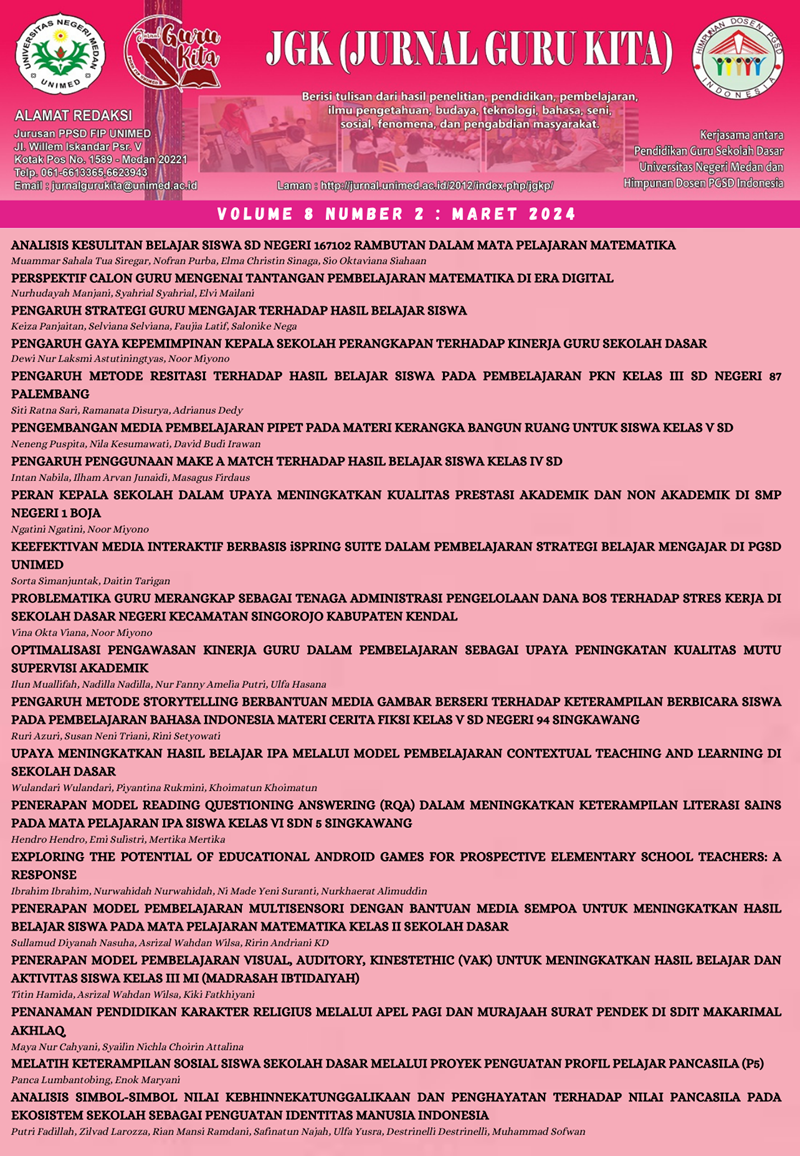PERSPEKTIF CALON GURU MENGENAI TANTANGAN PEMBELAJARAN MATEMATIKA DI ERA DIGITAL
DOI:
https://doi.org/10.24114/jgk.v8i2.56722Keywords:
Pembelajaran Matematika, Era Digital, Calon GuruAbstract
Penelitian ini bertujuan untuk menyelidiki perspektif calon guru mengenai tantangan dalam pembelajaran matematika di era digital. Metode penelitian yang digunakan melibatkan survei dan wawancara mendalam terhadap calon guru. Instrumen yang digunakan adalah kuesioner dan pedoman wawancara. Teknik analisis data yang digunakan adalah analisis kualitatif. Temuan penelitian mengungkap kompleksitas tantangan dan peluang dalam mengintegrasikan teknologi dalam pembelajaran matematika.References
Aydin, S., & Tasar, M. F. (2018). Pre-Service Mathematics Teachers' Perceptions Of Technology Integration In Mathematics Teaching. International Journal of Education in Mathematics, Science and Technology, 6(2), 117-132.
Bogdan, R.C. & Biklen, S.K. (2007). Qualitative Research For Education: An Introduction to Theory and Methods (5th Ed.). Boston: MA Pearson.
Brown, J., Smith, J., & Jones, B. (2019). The Relationship Between Teacher Technology Skills And Student Motivation In Mathematics Learning In The Digital Age. International Journal of Educational Technology, 10(4), 234-251.
Çetin, Ş. (2019). Pre-Service Mathematics Teachers' Views On The Use Of Technology In Mathematics Teaching. International Electronic Journal of Mathematics Education, 14(3), 143-158.
Chen, I. J., & Jang, S. J. (2022). The Effects Of Project-Based Learning With Augmented Reality On Students' Mathematical Learning And Learning Motivation. Educational Technology & Society, 25(4), 142-154.
Creswell, J.W. (2013). Qualitative Inquiry and Research Design: Choosing Among Five Approaches (3rd ed.). London: Sage Publications.
GarcÃa, J. F., & RodrÃguez, M. A. (2018). Technology Skills And Their Relationship With Interaction In The Mathematics Classroom. International Journal of Educational Research, 91, 142-153.
Goos, M., & Benham, B. (2008). Unpacking Pedagogy: A Framework For Understanding And Improving Teaching. Oxfordshire: Routledge.
Hsu, Y. C., & Lin, Y. J. (2023). The Effects Of Technology-Enhanced Project-Based Learning On Students' Mathematical Problem-Solving Ability And Learning Motivation. International Journal of Educational Technology, 14(2), 147-164.
International Society for Technology in Education (ISTE). (2023). Standards For Students. https://www.curriculumassociates.com/research-and-efficacy/annual-report-the-state-of-student-learning-in-2023
Kemendikbudristek. (2022). Panduan Implementasi Kurikulum Merdeka. Jakarta: Kementerian Pendidikan, Kebudayaan, Riset, dan Teknologi Republik Indonesia.
Korkmaz, Ö., & Öztürk, E. (2020). Pre-Service Mathematics Teachers' Beliefs And Perceptions About Using Technology In Mathematics Teaching. International Journal of Progressive Education, 16(3), 151-164.
National Council of Teachers of Mathematics (NCTM). (2020). Standards For Preparing Secondary Mathematics Teachers. NCTM. https://www.nctm.org/uploadedFiles/Standards_and_Positions/NCTM_Secondary_2020_Final.pdf
OECD. (2019). An OECD Learning Framework 2030. The Future of Education and Labor, 23-35.
Reigeluth, C. M. (2013). Instructional-Design Theories And Models: A New Paradigm Of Instructional Theory, Volume II. Oxfordshire: Routledge.
Sugiyono. (2022). Metode Penelitian Pendidikan: Pendekatan Kuantitatif, Kualitatif, dan R&D. Bandung: Alfabeta.
Thomas, D., & Smith, J. (2021). The Impact Of Technology-Supported Project-Based Learning On Students' Mathematical Understanding And Critical Thinking Skills. International Journal of Science and Mathematics Education, 19(4), 741-764.
Trianto. (2021). Model-Model Pembelajaran Inovatif: Berorientasi Pada Abad 21. Jakarta: Prenada Media.
Wulandari, D. (2023). Tantangan Dan Solusi Pembelajaran Matematika Di Era Digital. Jurnal Pendidikan Matematika dan Sains, 5(1), 1-10.
Downloads
Published
How to Cite
Issue
Section
License
Copyright (c) 2024 Nurhudayah Manjani, Syahrial Syahrial, Elvi Mailani

This work is licensed under a Creative Commons Attribution-ShareAlike 4.0 International License.
Authors published with the JGK (Jurnal Guru Kita) agree to the following terms:
- Authors retain copyright and grant the journal the right of first publication with the work simultaneously licensed under a Creative Commons Attribution License (CC BY-SA 4.0) that allows others to share the work with an acknowledgment of the work's authorship and initial publication in this journal.
- Authors are able to enter into separate, additional contractual arrangements for the non-exclusive distribution of the journal's published version of the work (e.g., post it to an institutional repository or publish it in a book), with an acknowledgment of its initial publication in this journal.
- Authors are permitted and encouraged to post their work online (e.g., in institutional repositories or on their website) prior to and during the submission process, as it can lead to productive exchanges, as well as earlier and greater citation of published work. (See The Effect of Open Access)


























